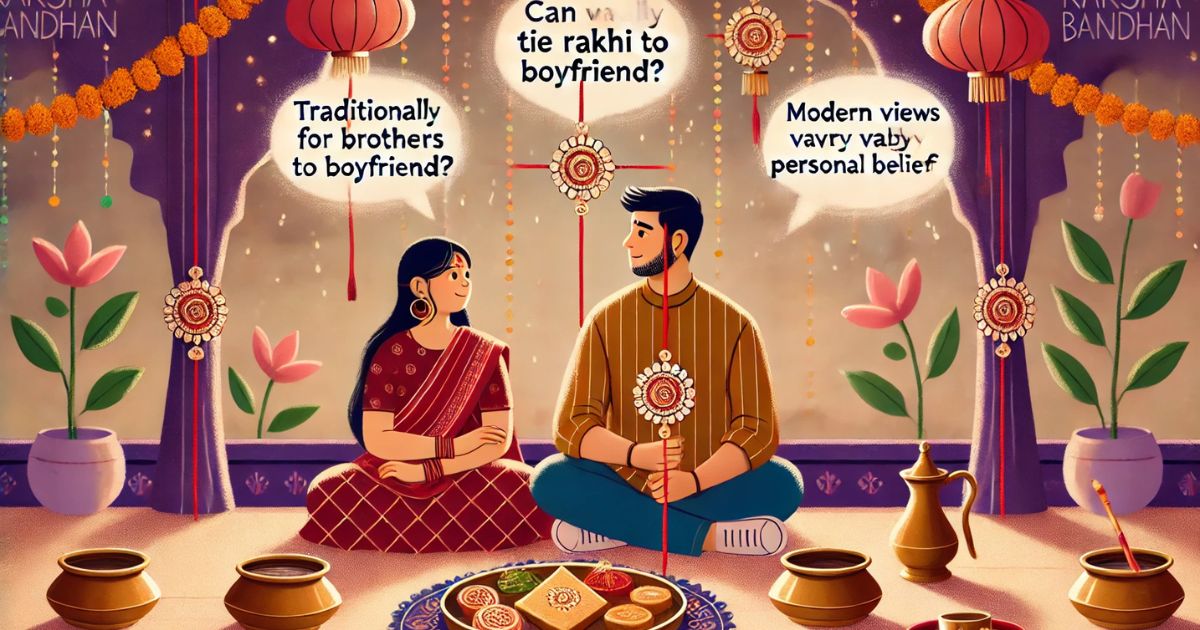
Raksha Bandhan, a cherished Indian festival, traditionally celebrates the bond between brothers and sisters. On this day, sisters tie a sacred thread, known as Rakhi, around their brothers’ wrists, symbolizing love, protection, and mutual respect. In return, brothers vow to protect their sisters and often present them with gifts. However, as societal norms evolve, questions arise about the applicability of this tradition to other relationships. One such query is: Can a girlfriend tie Rakhi to her boyfriend? This article delves into the historical context, cultural interpretations, and contemporary perspectives surrounding this question.
Historical and Cultural Context of Raksha Bandhan
To understand the nuances of tying Rakhi to a boyfriend, it’s essential to grasp the festival’s origins and traditional significance.
Origins of Raksha Bandhan
The term “Raksha Bandhan” translates to “the bond of protection.” Historically, the festival has been associated with various legends:
- Indra and Indrani: In Vedic times, Indrani, the wife of Lord Indra, tied a sacred thread around his wrist to protect him in battle. This act is considered one of the earliest instances of Raksha Bandhan.
- Yamuna and Yama: The river goddess Yamuna tied Rakhi to her brother Yama, the god of death, granting him immortality.
- Rani Karnavati and Emperor Humayun: Facing invasion, Rani Karnavati of Mewar sent a Rakhi to Mughal Emperor Humayun, seeking protection. Moved by the gesture, Humayun came to her aid.
These stories highlight that Raksha Bandhan has historically transcended biological sibling relationships, emphasizing the essence of protection and mutual respect.
Rakhi Beyond Sibling Bonds
While traditionally centered around siblings, Raksha Bandhan’s essence allows for broader interpretations:
- Friends and Neighbors: In various communities, individuals tie Rakhi to close friends or neighbors, symbolizing a bond of trust and protection.
- Sisters and Sisters-in-law: The Lumba Rakhi tradition involves sisters tying Rakhi to their brothers’ wives, emphasizing familial unity.
- Daughters and Fathers: Some traditions see daughters tying Rakhi to their fathers, acknowledging their protective role.
These practices underscore that the festival’s core values—love, protection, and respect—can be celebrated across various relationships.
Tying Rakhi to a Boyfriend: Perspectives and Implications
The idea of a girlfriend tying Rakhi to her boyfriend is multifaceted and can be viewed from different angles:
Affirmation of a Platonic Bond
For some, tying Rakhi to a boyfriend signifies a desire to redefine the relationship as platonic. This act can be a clear message that the individual views the relationship as one of friendship or sibling-like affection.
Cultural and Social Considerations
In certain contexts, especially among younger individuals, tying Rakhi to a male friend or suitor can be a way to set boundaries or navigate societal expectations. However, it’s essential to approach this with sensitivity, as it can have implications for the relationship’s dynamics.
Mutual Consent and Understanding
If both individuals understand and agree upon the symbolic nature of the Rakhi, it can be a meaningful gesture. However, it’s crucial to ensure that both parties are on the same page to avoid misunderstandings.
Contemporary Views and Discussions
Modern discussions around this topic reflect diverse opinions:
- Acceptance of Evolving Traditions: Some believe that traditions should evolve with time, allowing individuals to redefine rituals in ways that resonate with their personal beliefs and relationships.
- Preservation of Traditional Meanings: Others argue for preserving the traditional significance of Raksha Bandhan, emphasizing its roots in sibling relationships.
- Personal Choice and Autonomy: Many advocate for personal autonomy in deciding how to celebrate festivals, emphasizing that the meaning of rituals can be subjective and personal.
Conclusion
The question of whether a girlfriend can tie Rakhi to her boyfriend doesn’t have a one-size-fits-all answer. It largely depends on individual beliefs, cultural contexts, and mutual understanding between the individuals involved. While traditional interpretations of Raksha Bandhan focus on sibling bonds, the festival’s core values of love, protection, and respect can transcend specific relationships. Ultimately, the decision should be rooted in mutual respect and clear communication, ensuring that the gesture aligns with the sentiments of both individuals.
—






